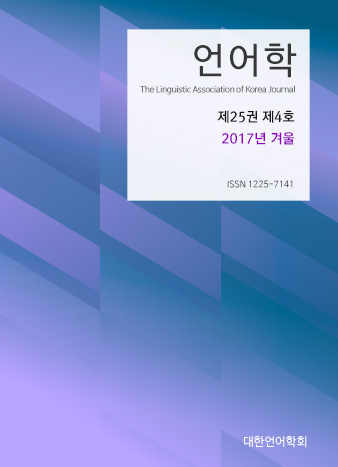대한언어학회 전자저널

25권 4호 (2017년 12월)
- Use of Corpus for Problem-Based Learning in a Korean Graduate English Grammar Course
-
Youn-Kyoung Lee
Pages : 83-102
Abstract
Lee, Youn-Kyoung. (2017). Use of corpus for problem-based learning in a Korean graduate English grammar course. The Linguistic Association of Korea Journal 25(4). 83-102. The present study explored the use of corpus for problem-based learning (PBL) in a Korean graduate English grammar course. The study involved 32 English education students in the Advanced English Grammar and Usage Course. Data included the students corpus research projects, reflection papers about corpus use, a Likert-scale questionnaire, and interview data. The results of the study revealed the following three themes in students use of, and reflection about, corpus study: (1) critical understanding about lexicogrammatical and broader language use issues, (2) awareness of the dynamic nature of language, and (3) appreciation of context- and register-appropriate use of lexicogrammar. The study also discussed the challenges involved in incorporating corpus use into English grammar classes and offered suggestions for further research.
Keywords
# use of corpus in an EFL grammar course # problem-based learning # advanced English grammar learning
References
- Aston, G. (2001). Learning with corpora: An overview. In G. Aston (Ed.), Learning with corpora (pp. 6-45). Houston, TX: Athelstan.
- Aijmer, K. (2009). Corpora and language teaching. Amsterdam: Benjamins.
- Barrows, H. S., & Tamblyn, R. (1980). Problem-based learning: An approach to medical education. Springer: New York.
- Biber, D., Johansson, S., Leech, G., Conrad, S., & Finegan, E. (1999). Longman grammar of spoken and written English. New York, NY: Longman.
- Burchfield, R. W. (1996). The new Fowler’s modern English usage. Oxford, UK: Clarendon Press.
- Burns, A., & Richards, J. C. (2011). Pedagogy and practice in second language teaching. New York, NY: Cambridge University Press.
- Carter, R., & McCathy, M. (2006). Cambridge grammar of English: A comprehensive guide-spoken and written English grammar use and usage. The Korea TESOL Journal, 9(1), 179-192.
- Clear, J. (2000). Do you believe in grammar? In L. Bernard & T. McEnery (Eds.), Rethinking language pedagogy from a corpus-based perspective (pp. 19-30). Frankfurt: Peter Lang.
- Cohen, L., Manion, L., & Morrison, K. (2011). Research method in education. New York, NY: Routledge.
- Conrad, S. (2000). Will corpus linguistics revolutionize grammar teaching in the 21st century? TESOL Quarterly, 34(3), 548-599.
- Cullen, R. (2008). Teaching grammar as a liberating force. ELT Journal, 62(3), 221-230.
- Curzan, A. (2009). Says who? Teaching and questioning the rules of grammar. PMLA, 124(4), 870-879.
- Duch, B. J., Groh, S. E., & Allen, D. E. (2001). The power of problem-based learning: A practical “how to” for teaching undergraduate courses in any discipline. Sterling, VA: Stylus.
- Table G., Hunston, S., & Manning, E. (1998). Cobuild grammar patterns 2: Nouns. London: Harper Collins.
- Hmelo-Silver, C. E. (2004). Problem-based learning: What and how do students learn? Educational Psychology Review, 16(2), 235-266.
- Hunston, S., & Table, G. (2000). Pattern grammar: A corpus-driven approach to the lexical grammar of English. Amsterdam: Benjamins.
- Hunston, S. (2002). Corpora in applied linguistics. Cambridge: Cambridge University Press.
- John, D. (2007). Experience and education. New York, NY: Touchstone.
- Kolln, M. J., & Gray, L. S. (2009). Rhetorical grammar: Grammatical effects, rhetorical effects. New York, NY: Pearson Longman.
- Lee, H.-J., & Lee, E.-J. (2010). The effects of corpus-based vocabulary tasks on high school students’ English vocabulary learning and attitude. The English Teachers Association in Korea, 16(4), 239-265.
- Lee, Y.-K. (2016). Corpus-based English grammar instruction in a Korean college context. The Linguistic Association of Korea Journal, 24(1), 39-60.
- McEnery, T., Wilson, A., & Baker, P. (1997). Teaching grammar again after twenty years: Corpus-based help for teaching grammar. Recall 9(2), 8-16.
- Micciche, L. R. (2004). Making a case for rhetorical grammar. College Composition and Communication, 55(4), 716-767.
- O’Keeffe, A., McCarthy, M., & Carter, R. (2007). From corpus to classroom: Language use and language teaching. Cambridge: Cambridge University Press.
- Ryan, G. W., & Bernard, H. R. (2003). Techniques to identify themes. Field Methods, 15(1), 85-109.
- Savery, J, R. (2006). Overview of problem-based learning: Definitions and distinctions. The Interdisciplinary Journal of Problem-based Learning, 1(1), 9-20.
- Schmitt, N. (2004). Formulaic sequences. Amsterdam: Benjamins.
- Schmitt, N. (2005). Current research perspectives and grammar teaching. Paper presented at the 39th TESOL Convention, San Antonio, Texas.
- Sealey, A., & Thompson, P. (2004). ‘What do you call the dull words?’ Primary school children using corpus-based approaches to learn about language. English in Education, 38(1), 80-91.
- Sealey, A., & Thompson, P. (2007). Through children’s eyes?: Corpus evidence of the features of children’s literature. International Journal of Corpus Linguistics, 12(1), 1-23.
- Sinclair, J. M. (1991). Corpus, concordance, and collocation. Oxford: Oxford University Press.
- Torp, L., & Sage, S. (2002). Problems and possibilities: Problem-based learning for K-16 education (2nd ed.). Alexandra, VA: Association of Supervision and Curriculum Development.